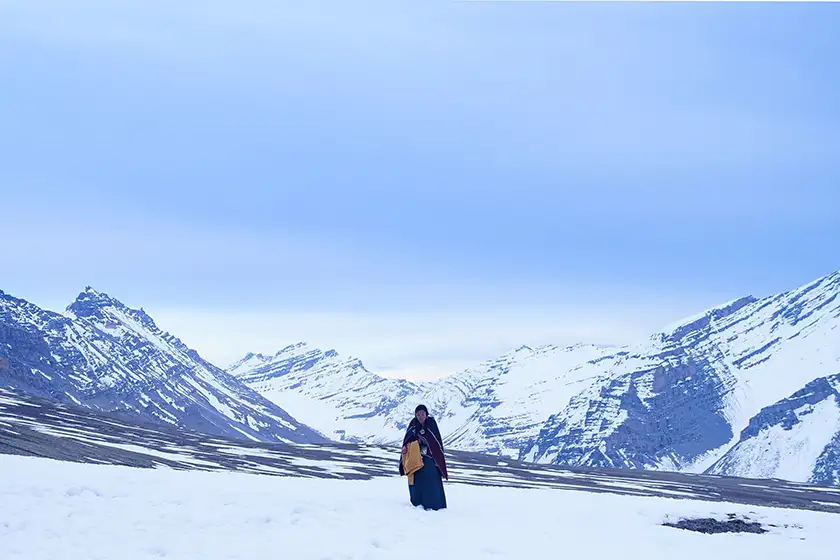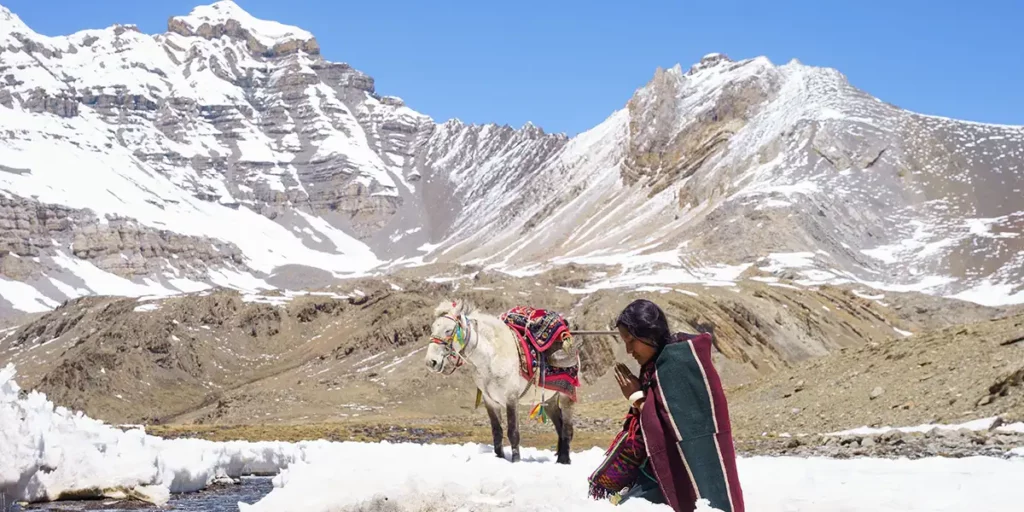A recently pregnant woman leaves her village to find her husband in Shambhala, Min Bahadur Bham’s evocative, beautiful, but overly long drama.
Pema (Thinley Lhamo, Hari) lives in a Himalayan polyandrous village with her three husbands, who are all brothers. Their rural life is carefully drawn by director/co-writer Min Bahadur Bham (The Black Hen), with the first 30-40 minutes a calm depiction of the initial marriage and their life after this, the opening title of Shambhala not displaying until around this mark. It’s a slowness that is invigorating, and whilst it can cause the latter parts of Shambhala to drag slightly, especially when the narrative becomes too slight, it always feels like a breath of fresh air.
Pema has three husbands, but the one she connects with most is Tashi (Tenzin Dalha, Axone). After he leaves on a trading trip for several months, Pema falls pregnant, with a rumour circulating in the village that the father is in fact another man. Tashi, hearing it from afar via other settlements, takes the news badly, so Pema decides to set out to find him. It’s an interesting if slightly odd basis for the plot, as Tashi’s distrustful behaviour is off-putting and immature. But as Shambhala develops, it becomes less a romance, and more an invigorating journey of liberation for Pema.
She is joined on the trek by another of her husbands, a monk called Karma (Sonam Topden, Samhalinchha Kahile Mann). The pair share long horse rides in the vast mountainscapes and winding rivers of Nepal. Throughout Shambhala, Bham observes proceedings with a patient eye, allowing scenes to envelop with a gorgeous naturalism as the camera floats around gently. He shows a keen ability to engage the viewer with each carefully constructed scene, despite the film’s slow-moving nature and languid pacing. We come to care deeply for Pema, sharing in her meditative, soul-stirring trek. As the central character, Lhamo is terrific, a calming screen presence whose laidback demeanour wonderfully contrasts with her fierce, independent spirit.

Despite its impressively serene atmosphere, Shambhala does feel too long. Bham’s film doesn’t justify its 150-minute runtime; however much we are engaged with Pema’s journey, there isn’t quite enough depth to it in terms of plot. Shambhala is narratively slight, and its understated nature becomes both its biggest strength but also one of its weaknesses. Bham doesn’t take the narrative to the next level, never delving quite deep enough into the characters and their relationships, and he sometimes seems more keen on the look and feel of scenes as opposed to their dramatic purpose or relevance to the main plot.
As Shambhala ties up in expectedly calm ways, it is left a bit unclear as to what has actually happened. Ultimately, this ambiguity reflects Pema’s own experience, as a quick narration by her reaffirms how she has now found freedom and enlightenment, whatever form that may take. She herself isn’t entirely sure what it will look like, so neither are we. It is a shame that Shambhala’s thin narrative detracts from some of the conclusion’s power, but it is a film that will still wash over you like a calm mountainous breeze and uplift your spirits.
Shambhala premiered at the 2024 Berlin Film Festival. Read our Berlin Film Festival reviews!

